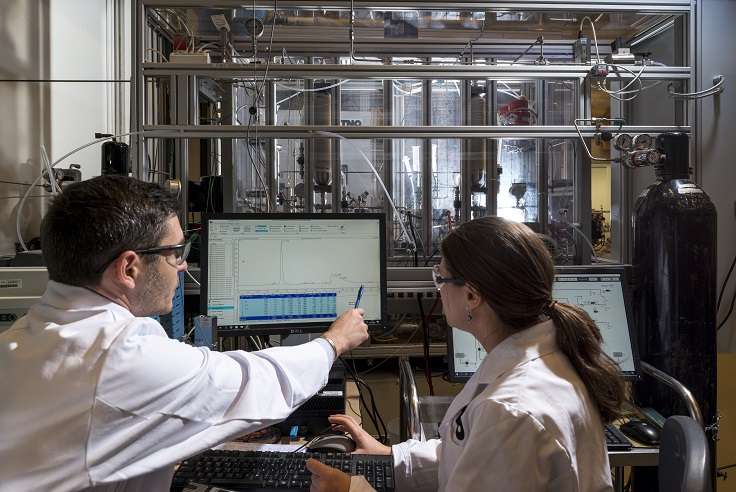

Pilot for synthesis of formic acid from CO2 at Twence waste incineration site
17-03-2019 | New Project | P2Chemicals
 On February 21, the Twence waste incineration company officially launched the development of a pilot plant for converting CO2 into formic acid. This pilot builds on the VoltaChem Power-2-formic acid project where a reactor was developed and tested in cooperation between Coval Energy, VoltaChem/TNO, and TU Delft. Now the technology will be scaled up towards the pilot plant at the Twence site in Hengelo.
On February 21, the Twence waste incineration company officially launched the development of a pilot plant for converting CO2 into formic acid. This pilot builds on the VoltaChem Power-2-formic acid project where a reactor was developed and tested in cooperation between Coval Energy, VoltaChem/TNO, and TU Delft. Now the technology will be scaled up towards the pilot plant at the Twence site in Hengelo.
Twence, established by fourteen municipalities in the Twente region, aims at recovering more raw materials from waste and waste wood and producing more energy from renewable sources, as a contribution to realizing a sustainable society. The company already collects CO2 from its Hengelo incinerator plant for the production of sodium bicarbonate. It now plans to use its CO2 as a feedstock, together with water and electricity, for the production of the more valuable 'green' formic acid.  In the Phecam project design specifications will be developed in preparation for the actual building of the pilot plant. Phecam is supported by the Topsector Energy through TKI New Gas.
In the Phecam project design specifications will be developed in preparation for the actual building of the pilot plant. Phecam is supported by the Topsector Energy through TKI New Gas.
Towards viable industrial application
Twence, as end user, and Coval Energy, as a technology supplier, have already signed a letter of intent to further develop the technology so that it can be applied on a commercial scale from 2020 onwards. In Phecam, VoltaChem/TNO and TU Delft support this development with their expertise and R&D efforts.
This fits perfectly with the objectives of Voltachem's Power-2-Chemicals program, aiming amongst others at a viable industrial application of electrochemical CO2 reduction. Coval Energy's project manager Rien van Haperen is pleased that Twence now takes the next step in formic acid production from CO2: "We are very happy that they see the potential of the technology, as do we, obviously."
Great opportunities for formic acid
One of the possible applications of the formic acid is that as 'green fuel'. It can be used for the generation of electricity in the fuel cells of future transport vehicles. Since the energy density of formic acid is higher than what can be achieved using conventional battery technology, a fuel cell vehicle driving on formic acid would have a considerably larger range than current electric vehicles.
Making this scenario reality would however require the formic acid to be of very high purity. According to Van Haperen, there are also great opportunities for formic acid as an intermediate product. One of the promising applications is to further develop it into formate salts that can be used for 'feeding' bacteria in bioreactors. "This could become a huge market for sustainable formic acid".
Are you interested in Power-2-Chemicals technology?
Contact our Business Development Manager Willem Frens to discuss how VoltaChem can be of benefit to you.
Read more details on the Power-2-FA project in this earlier news item.
Share this page: